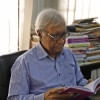A case delayed, but not forgotten

March 6 marks the 12th anniversary of Taqi's murder. It also marks a decade of impunity. On the evening of March 6, 2013, Tanwir Muhammad Taqi was abducted from Bangabandhu Road in Narayanganj on his way to the Sudhijon Pathagar, a local library. That night, I filed a general diary with the Narayanganj Sadar Model Police Station and wrote to RAB-11. Two days later, on the morning of March 8, police recovered Taqi's body from the banks of a canal of the Shitalakkhya River. On the night of March 8, I filed a murder case with the Narayanganj Sadar Model Police Station, mentioning unknown assailants. Five days later, from a phone conversation between Shamim Osman's brother, MP Nasim Osman, and his son, Azmeri Osman, we became certain about the cause of the murder and who the killers were. On March 18, we submitted a notice to the superintendent of police, naming eight individuals, including Shamim Osman and his son. However, when the involvement of Shamim Osman's family was found in the investigation, the police showed reluctance to proceed with the case. Later, under the direction of the High Court, the RAB took over the investigation of the Taqi murder case on May 28, 2013.
On July 29 of that year, Yusuf Hossain Liton, and on November 12, Sultan Shawkat Bhramar—two of the accused—gave confessional statements in court under Section 164, revealing when, how, where, by whom, and why Taqi was murdered. According to their description, they killed Taqi on the night of his abduction, before midnight, in the torture cell on Allama Iqbal Road, at the order of Azmeri Osman and in his presence. They first beat Taqi unconscious with a Gajari stick, and then Kalam Shikder climbed on his chest and strangled him to death. Later, they took Taqi's body to the banks of the Shitalakkhya River in Azmeri's car and disposed of it in the river by boat.
One year after Taqi's murder, on March 5, 2014, the Additional Director General of RAB, Ziaul Ahsan, claimed at a press conference held at the RAB headquarters that the mystery of Taqi's murder had been uncovered. He mentioned that 11 people, led by Azmeri Osman, killed Taqi. They cited three reasons for the murder: first, the strong stance of Rafiur Rabbi, Taqi's father, in favour of Selina Hayat Ivy in the Narayanganj City Corporation election in 2011; second, the movement he organised with the people of Narayanganj against Shamim Osman and his loyalists' widespread extortion in public transport; third, the leadership role he played in the people's movement against land grabbing by an identified group.
RAB prepared a charge sheet mentioning these three reasons, which angered the killers, and provided it to journalists in a press conference. RAB then informed that this charge sheet would soon be submitted to the court. However, on June 3, 2014, when then-Prime Minister Sheikh Hasina pledged to stand by the Osman family in a parliament session, the investigation into Taqi's murder came to a complete halt. Although the trials of several high-profile murders in the country had been completed during that time, the charge sheet for Taqi's murder was not submitted to the court. As a result, the identified killers, including the accused who confessed under Section 164, either went abroad or roamed around the country on bail from the High Court. Although identified as guilty, Azmeri Osman was never arrested. He roamed around the city arrogantly, with the help of the administration and the police.
In the 12 years since Taqi's murder, Sheikh Hasina's government and administration have provided protection to Taqi's killers for eleven and a half years. Shamim Osman, on the other hand, failing to prevent those who sought justice for Taqi's murder through various forms of intimidation, resorted to attacking them and harassing them by filing cases. He threatened to cut us into pieces and feed us to the fish in the Shitalakkhya River, cut our tongues to feed dogs, trample us underfoot like ants, dismantle our homes brick by brick, and abduct our wives and daughters to prevent us from seeking justice. Many cultural and political activists fell victim to his attacks. They have even attacked various cultural events, including Rabindra Jayanti. Shamim Osman filed seven cases against me through his party cadres, his wife, his uncle-in-law, and various relatives and close associates. He filed cases against me under the Digital Security Act and also made the Hefazat-e-Islam leaders file cases against me, accusing me of blasphemy. He organised rallies and led processions against me with slogans like, "We want his head, we want his execution," etc.
Protests have taken place in 23 countries around the world demanding justice for Taqi's murder. For 12 consecutive years, various programmes such as rallies, human chains, press conferences, candlelight vigils, roundtable meetings, and symbolic hunger strikes have been held to demand justice. Writers, artists, and intellectuals in the country have continuously sought justice for this murder—through their writing, poetry, painting, song composition, documentary films, commemorative books, and the release of songs and CDs of recitation. Since March 8, 2013, the day when Taqi's body was found, the Narayanganj Sangskritik Jote has been holding a candlelight vigil on the 8th of every month for the last 12 years. Such continuous movement demanding justice for a murder is rare. We learned from newspapers that Sheikh Hasina told her party leaders that she knew who killed Taqi and that she had all the intelligence agency reports with her. The sad truth is that she had not ensured justice for Taqi's murder but rather stopped the process of justice.
After the change of government in August last year, the case proceedings resumed. Six new accused have been arrested, and one of them, Kajal Hawlader, gave a confessional statement under Section 164. He has provided a detailed description of Taqi's murder in Azmeri Osman's torture cell, which is similar to the previous confessions.
The investigation revealed that, at the direction of Shamim Osman, his son, nephew, and party cadres killed Taqi in their torture cell. We demand that the investigation into Taqi's murder be completed quickly and that all the criminals, including those who ordered it, be brought to justice. Let us create a society where no such murder occurs again, where our justice system is independent, and the rule of law prevails.
Rafiur Rabbi is a writer, activist and father of Tanwir Muhammad Taqi.
Views expressed in this article are the author's own.
Follow The Daily Star Opinion on Facebook for the latest opinions, commentaries and analyses by experts and professionals. To contribute your article or letter to The Daily Star Opinion, see our guidelines for submission.

 For all latest news, follow The Daily Star's Google News channel.
For all latest news, follow The Daily Star's Google News channel. 











Comments